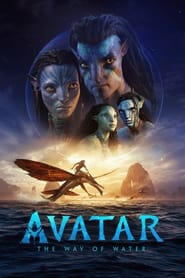Did James Cameron really spend $250m of investor's money to indulge in the fantasy common to all white liberal males: that a black guy will give him a high-five whilst calling him "cuz"?
But that's not entirely fair. Still, Cameron, who has a budget of virtually infinite size (and has the clout and skill to produce almost anything he wants), making four films infused with so many First People signifiers is painfully like the white guy with dreadlocks. Indeed, one of his few obvious mistakes is to include such a character; all his other mistakes require a critical eye to spot — Cameron has such a good nose for mainstream spectacle that this 3h12m movie only feels like a 2h40m one.
(As an aside, what is it with this obsession of filmmakers with their fathers and fatherhood? Or, perhaps, what is it about being a director that attracts those who have a difficult relationship with theirs? The Way of Water seems to have a strange relationship with fatherhood in many ways, not least of all that the film clearly endorses the rather reactionary conceit that the sole consideration of a father is to "protect" the rest of the family. Safety is an entirely valid concern for parents (!), but to imply that it no other consideration should ever be factored in and that it has some sort of deeper existential meaning—that it, in the words of the film, "is what gives a father meaning"—seems to license almost any whim of a father if it can be spun as "for your own good." )
This is, of course, not a perfect movie, but watching this in 3D certainly helped disguise that the characters were only 2D. Yet perhaps we've just reached the heart of this film: all arguments in favour of its greatness are varieties on a theme of 'at least it isn't another...', or 'better this than...' All of this is fair, and if The Way of Water was made in 2002 instead, it would land like a poor Waterworld sequel. Still, it was made in the strange artistic and economic episteme of the 2020s, and this film's production and situation are surrounded by yet another weightless Marvel/MCU that even the director will forget about in a year. This paratext cannot be divorced from the film, however much we try.
To my mind, it's better than the original Avatar in almost all respects, not least the much-mocked "Unobtanium" political conceit has been replaced with a far more complex interrogation of settler colonialism and Man's inhumanity to… blue people.

